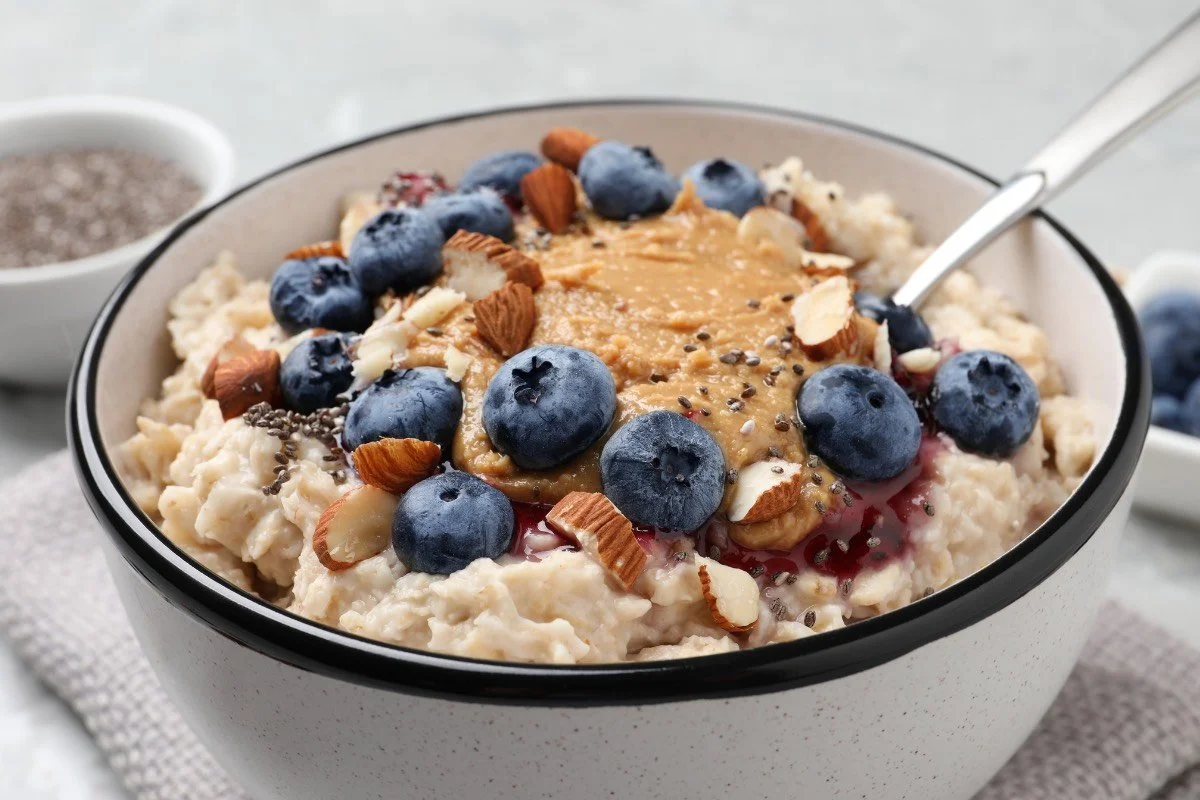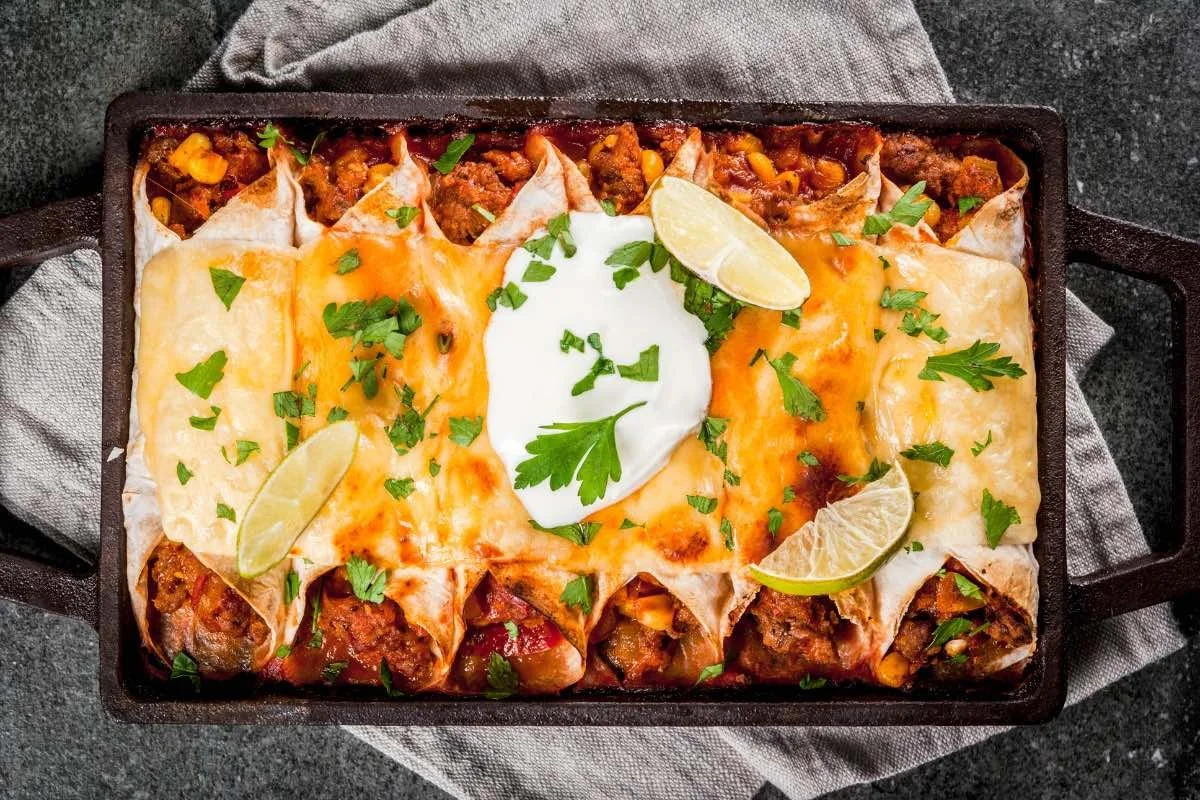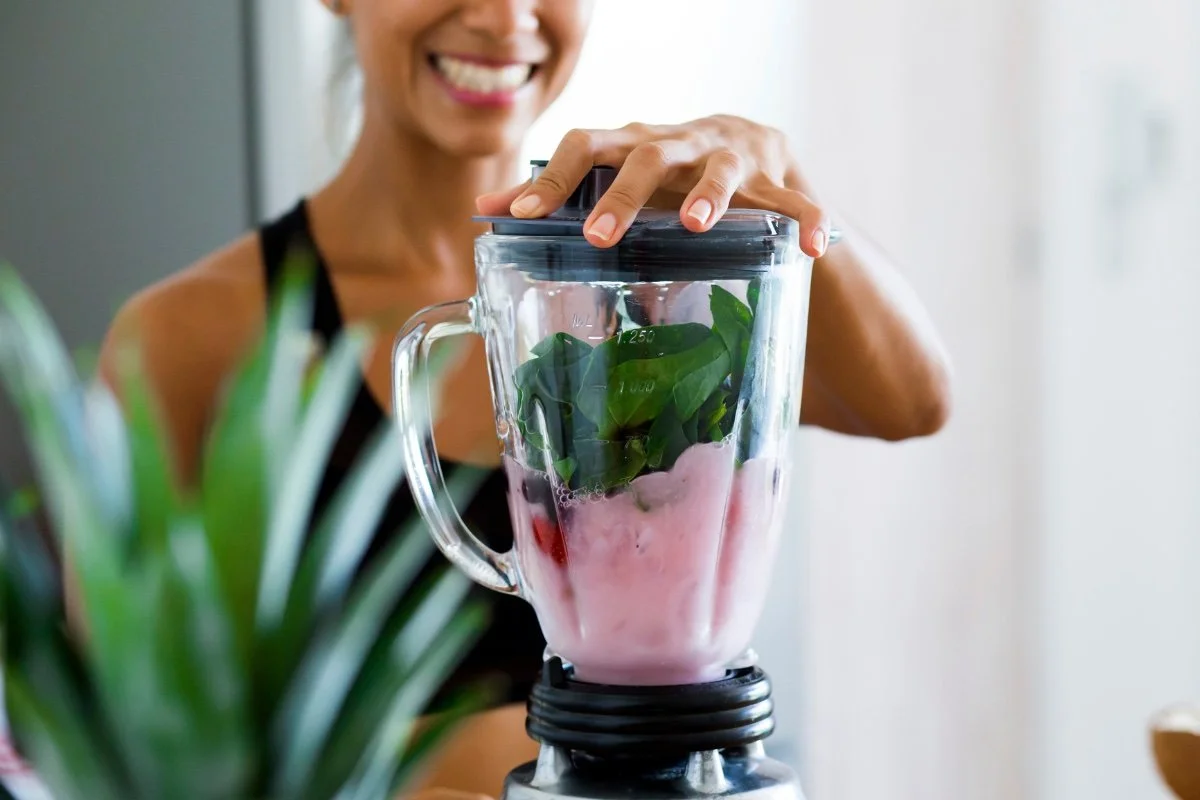What No One Tells You About Your Postpartum Diet (and Why It Matters!)
Whether you’re a first-time mum or doing the newborn thing again, postpartum is a rollercoaster of recovery, emotions, and a whole lot of change and adjustment.
Between round-the-clock feeds, settling your baby, and adjusting to this whole new world, I know that even thinking about food for yourself can feel like a stretch.
But here's the thing: your body is still doing a lot right now — healing from birth, producing milk if you're breastfeeding, balancing hormones, and recovering from pregnancy.
So you need plenty of care and nourishment too.
Read on for how to make a nutritious postpartum diet simple and doable.
After having two babies relatively close together, I know how easily you can forget to take care of yourself or simply think it’s not a priority.
After my second baby was born, I made the mistake of not prioritising my own nourishment, and paid the price - exhaustion, low mood and a rapidly dwindling milk supply - which all made for a very unhappy mom and baby!
Which is one of the reasons why I’m so passionate about teaching new moms about the importance of postpartum nutrition - so they can avoid making the same mistakes I made.
In this post, we’ll look at:
Why nutrition matters after birth
The key nutrients to focus on
Why rapid weight loss isn’t recommended
What foods can help you feel your best during this new season
Why nutrition matters (a lot!) after birth
No matter how you do it, giving birth is a big deal.
Your body has just grown a whole human, and now it’s working overtime to heal, adjust hormonally, produce milk if you’re breastfeeding, and keep you functioning on minimal sleep.
Your postpartum diet does a lot of heavy lifting. It’s responsible for:
Helping your body heal
Replenishing nutrients lost during pregnancy and birth
Supporting your energy levels and mood (while you’re getting very little sleep!)
Helping to produce milk if you’re breastfeeding
And as the old saying goes, you can’t pour from an empty cup - taking care of yourself is an essential part of taking care of your baby.
Why rapid weight loss shouldn’t be the goal
I know, I know - there’s a lot of pressure to “bounce back” after giving birth.
And after housing a baby for 9 months, you just want to feel like yourself again ASAP.
But the truth is that your body isn’t meant to look or feel like it did before pregnancy—at least not right away.
In fact, aiming for fast weight loss can have some fairly drastic consequences, such as:
Disrupting your hormonal balance
Reducing milk supply if you’re breastfeeding
Increasing your risk of nutrient deficiencies
Overall depletion and exhaustion
Weight loss may come naturally over time—but your main goal right now is healing, strength, and stamina.
What nutrients should you prioritise postpartum?
You don’t need to worry about macros or meal timing (you’ve got enough to deal with right now!). Nor is this a time to aim for a perfectly nutritious diet!
But understanding which nutrients matter most can help you nourish your body and maximise recovery and breastmilk supply.
Iron
The demands of pregnancy (i.e. growing another human) plus blood loss during birth and recovery means iron is often depleted postpartum.
Low iron can lead to fatigue, poor concentration, and dizziness.
The richest sources of iron are red meat, chicken and fish, but iron is also present in eggs, legumes, whole grains, iron-fortified breakfast cereals, green leafy vegetables, nuts and seeds.
*Pair eggs and plant-based sources of iron with a vitamin C-rich food (e.g. citrus, tomatoes or berries) to increase absorption.
Protein
Crucial for tissue repair in postpartum recovery, for optimal breastmilk production, and also to satisfy that crazy postpartum appetite.
Good sources of protein include meat, poultry, eggs, cheese, yoghurt, nuts, tofu and legumes (lentils, baked beans, chickpeas etc.).
Carbohydrates
Carbohydrates are our body’s preferred source of energy, and energy is something you’re going to need a whole lot of right now!
BUT, it’s important to remember that not all carbs are equal.
The best sources of carbohydrates are whole grains, fruit, starchy vegetables and legumes as these are generally more nutritious and satisfying compared to refined white bread and grains and foods with a lot of added sugar.
Fiber
With hormonal changes, iron supplements, and less movement, constipation is common postpartum.
Eating enough fiber can help get things moving again and support healthy digestion as your body recovers.
Good sources of fiber include wholegrains, fruit and veg (preferably with skin), legumes, chia seeds and flaxseeds.
Try having oats or porridge for breakfast, adding lentils or beans into soups or salads, including fruit in snacks or sprinkling chia or flaxseeds on yoghurt to boost your intake throughout the day.
Don’t forget hydration, too—drinking plenty of water helps fiber do its job and keeps your digestion running smoothly.
Omega-3s (especially DHA)
These healthy fats support brain function, reduce inflammation, and have been shown to lower the risk of postpartum depression.Omega-3 fatty acids are passed through breast milk to your baby to support their brain development.
Oily fish such as salmon, mackerel or sardines is the best source of omega-3 fatty acids (aim for a couple of serves each week if possible), but they can also come from chia and hemp seeds, walnuts, and flaxseeds.
Calcium
If you’re breastfeeding, your calcium needs increase to support both your baby’s development and your own bone health.
Breastmilk contains a lot of calcium to support the development of your baby’s bones and teeth. If your diet doesn’t contain enough, your body will use calcium from your bones instead.
Luckily, this calcium loss is usually recovered within a few months once you stop breastfeeding, but it’s important to try to get enough calcium from your diet to protect your bones as much as possible.
Dairy foods are the best source of calcium, but other sources include fish with bones such as canned salmon and sardines, almonds, tahini and calcium-fortified products such as soy, almond and oat milk (just check the label to make sure they have calcium added).
The recommended intake of calcium during breastfeeding is 1000mg/day, which is equivalent to around 3 serves of dairy (1 serve = 1 glass of milk OR 200g tub of yoghurt OR 1 slice of cheese).
Vitamin D
Supports immunity and mood regulation. Most women don’t get enough from food or sunlight alone.Vitamin D helps the body to absorb and use calcium.
It’s mostly made in the skin by the action of sunlight and only a small amount of vitamin D actually comes from food such as oily fish, egg yolk and margarine.
Vitamin D supplementation isn’t necessarily required during breastfeeding unless your vitamin D levels were low during pregnancy.
However, whether your baby is breastfed or formula-fed, a supplement of 400IU daily of vitamin D is recommended for their first 12 months.
Not all vitamin D supplements are suitable for babies so ask your pharmacist to recommend a vitamin D suitable option.
Choline
A little-known nutrient, choline is similar to a vitamin and plays an integral role in babies’ brain development.
For this reason, choline requirements increase significantly during pregnancy and breastfeeding, but, unfortunately, many pregnant and breastfeeding women don’t get enough.
Good sources of choline include eggs, meat, poultry, fish, nuts, legumes and cruciferous vegetables like broccoli, cauliflower, cabbage and kale.
You can also take a choline supplement if you’re worried you won’t be able to get enough choline from your diet alone.
Iodine
Iodine is needed to produce thyroid hormones which play an important role in brain development in babies. Iodine is passed through breastmilk, but concentrations can vary depending on the mother’s iodine status.
Iodine can be found in seafood, dairy foods, iodised salt and bread, however, it can be difficult to get enough iodine from food, so a supplement might be necessary.
An additional 150 micrograms of iodine is recommended if you’re breastfeeding, which is the amount present in most breastfeeding multivitamins - but check the nutrition information on the label to see how much your multivitamin contains.
Foods that help you feel your best
Rather than following a strict plan, aim to eat regular, balanced meals and snacks that help you feel satisfied and supported.
And remember, you can keep it as simple as you need to - peanut butter on wholegrain toast is a perfectly nutritious meal!
Here is an example meal plan to give you an idea.
Example Postpartum Meal Plan
Breakfast
Oatmeal with toppings
Rolled oats cooked with full-fat milk or a plant-based alternative
Topped with chia seeds, sliced banana, berries, and a spoonful of peanut butter
Herbal tea or water
Morning Snack
Greek yogurt parfait
Full-fat Greek yogurt
A handful of granola and fresh blueberries
Drizzle of honey
Lunch
Chicken and salad wrap
Wholegrain wrap
Cooked chicken
Avocado slices + salad of choice
Hummus
Afternoon Snack
1-2 hard-boiled eggs + handful of trail mix
Dinner
Salmon tray bake with sweet potato mash and steamed greens
Evening Snack
Sliced apple with almond butter or an energy ball
For more meal and snack ideas, check out my blogs:
Delicious and Nutritious Postpartum Meals
Delicious and Nutritious Postpartum Snacks
Hydration
Don’t underestimate the power of fluids — especially if you’re breastfeeding.
Keep water bottles within reach so you’ve always got one handy, even when you’re chained to the sofa feeding 24/7.
And don’t forget, other fluids also count, so include herbal teas, soups and smoothies too if that makes it easier to meet your fluid requirements.
Special postpartum diet considerations
If you’re breastfeeding
You’re literally making food for another human, so it makes sense that you’re going to need some extra calories yourself.
Breastfeeding requires around an additional 500 calories per day, which is more than during any stage of pregnancy!
That insane hunger you're feeling probably makes it easy to meet your additional calorie needs, but make sure you’re not neglecting your own meals and snacks.
Focus on nutrient-dense, satisfying meals that help maintain your supply and energy.
And remember, breastmilk contains a lot of fluid, fluid which needs to be replaced.
Most women find they’re a lot thirstier while breastfeeding, so in this case you can just drink to satisfy your thirst. But make sure you’re having around 2.6L or nine glasses of water each day, which is the recommended amount during lactation. All fluids count towards this total, but water is the best choice.
If you had a c-section
Your body has undergone major surgery— so you’ll have increased needs for nutrients that support wound healing, like protein, vitamin C, and zinc.
Staying well-hydrated and focusing on fiber-rich foods can also help ease post-surgery constipation and allow for a smoother recovery.
If you’re feeling anxious or low
It’s normal to have emotional ups and downs postpartum.
A balanced diet can help support your mood—but it’s not a replacement for support from your GP or mental health professional, so please make sure you speak to them ASAP.
Tips for making postpartum easier
Prep when (and if!) you can
Some days you’ll have the energy to prep a few snacks or meals ahead — other days, not so much (and that’s okay!).
When you do have a window, even chopping veggies or cooking a double batch can make a big difference later in the week.
Keep snacks close
Whether you’re feeding, rocking, or contact napping, having snacks - preferably one-handed ones - within arm’s reach can be a game changer.
Stock your bedside table, couch, or nappy bag with easy, nourishing options so you’re not running on empty.
Eat when your baby eats
Try to use their feeding times as a reminder to nourish yourself too. Even a quick snack can help keep your energy up and support your recovery.
Pack a lunchbox when you’re heading out
Leaving the house with a new baby can be unpredictable — having a lunchbox packed with snacks or a simple meal means you won’t be caught hungry or relying on whatever you can grab on the go.
Say yes to help
If someone offers to cook, tidy up, hold the baby, or grab some groceries — let them! Accepting help doesn’t mean you’re not coping; it means you’re wise enough to know you can’t do it all alone.
Lightening your load lets you focus on rest, recovery, and bonding with your baby. And in general, people really do want to help!
Try a meal delivery service
In the early postpartum weeks, cooking can feel like a stretch.
A meal delivery service can take the pressure off, making it easier to get nourishing, ready-to-eat meals without the prep or cleanup — giving you more time to rest and recover.
Final thoughts
You don’t have to eat “perfectly” to feel good postpartum.
You just need to nourish yourself in a way that feels doable right now.
Forget the bounce-back culture—this is a time for restoration, not restriction.
If you’d like support with your postpartum nutrition—whether it’s about meals, supplements, or just finding your rhythm—I offer 1:1 consultations specifically for postpartum.
You can book a session here










